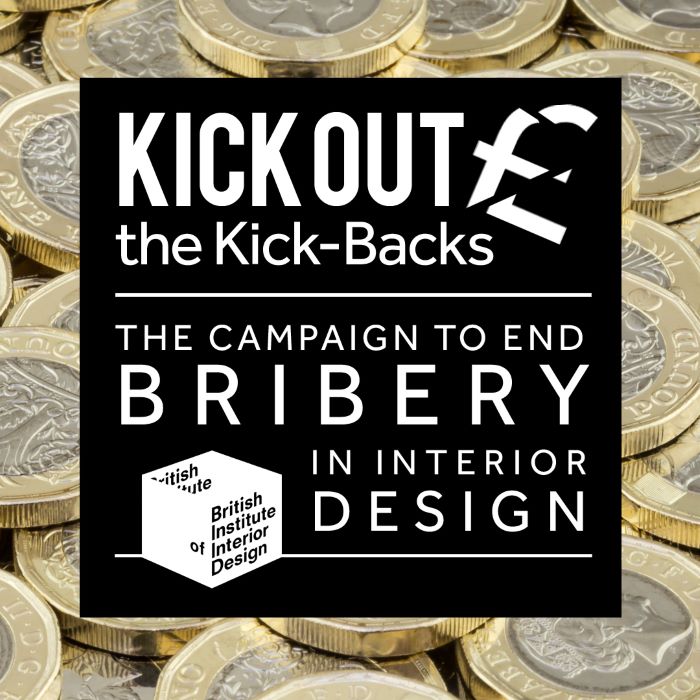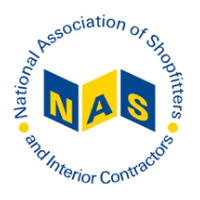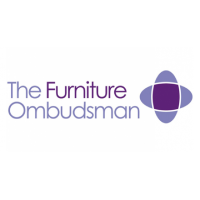Kick Out The Kick-Backs Questions Answered
Following the launch of the Kick Out The Kick-Backs campaign, we invited designers to submit their questions about kick-backs, commissions and bribes. We asked Simon Biggin, a Partner in the Dispute Resolution team at Hewitsons to answer a selection.
Kick Out The Kick-Backs - Answers to your questions.
For anyone new to the campaign the initial article gives a full introduction.
1. We receive commissions from suppliers and trades people and believe it is the right business model for us and our clients. However, we also wish to be transparent with our clients. If we include a line on our Terms and Conditions stating something along the lines of ‘Studio X may receive commissions on products and services from suppliers they have introduced to clients’ would that indemnify us against any accusations of bribery? Or do we have to declare each individual commission we receive on a project?
There will be differing views amongst lawyers as to what is sufficiently transparent for Bribery Act purposes.
Your proposed line (but I would say “Studio X receives etc” and not “Studio X may receive”) should be a sufficient indemnity against any accusations of bribery from the authorities.
However, certainly from the perspective of maintaining trust and confidence with clients, the safer course would be to declare commissions on an individual basis.
2. How would the Bribery Act affect rewards schemes? There are some online furniture and product retailers that have a cash rewards scheme. This means that the more furniture and products that a designer purchases (and then sells on to their clients) the more cash rewards the designer accumulates, that they can spend on that website. If a designer has a contract with a client where they offer professional services, in addition to supplying products to that client on a retail basis, do they have to declare to the client that they benefit from such a rewards scheme?
Rewards schemes are common in the design and construction sector.
In 2015, there was a Scottish company (Brand-Rex) which fell foul of the Bribery Act.
Although the incentive scheme operated by Brand-Rex was not found to be unlawful, one of its independent installers offered his travel tickets (earnt under the incentive scheme) to an employee of one of his customers who was in a position to influence purchasing decisions.
When Brand-Rex discovered this, it self-reported to the authorities the corporate offence of failing to prevent bribery by an associated person under section 7 of the Bribery Act.
The case was settled with an agreed fine (a civil recovery order) of just over £200K instead of prosecution.
The Brand-Rex case did not go into detail as to why its incentives scheme was lawful. However, such schemes tend to be very business like and quite often the customer will not be entitled to something like an annual rebate unless his account is in credit.
Transparency is key with Bribery Act issues and the better course would be to include a line in your terms and conditions to the effect “From time to time, we benefit from rewards schemes operated by some of our retailers”.
3. What should I do if I now realise I may have accepted a bribe in the past? Is there a statute of limitation under the Bribery Act? What potential financial damages could I face if they pursue a civil claim?
There is no statute of limitation for Bribery Act offences. This means that a Bribery prosecution can be made many years after the event.
If one was dealing with a corporate client concerning a past bribery situation which was material in terms of value or the number of times there had been a transgression then, the lawyer advising should give advice about self-reporting to the authorities.
For the reasons given below, if the bribe was for a relatively modest sum, then one would think in terms of drawing a line but (as per the answer given under question 1 above), ensuring that there is sufficient transparency going forwards concerning future commission payments.
When considering whether to prosecute for an offence under the Bribery Act, the public prosecutor would need to consider whether it is in the public interest to do so. Prosecutors are more concerned with high profile companies (e.g. Rolls Royce which, under a plea bargain, agreed a £293m fine, a disgorge of profits of £258m and a payment to the Serious Fraud Office in respect of costs of £13m!); or, the bribing of public officials (e.g. in 2011, a clerk at Redbridge Magistrates Court became the first person to be prosecuted under the Act for accepting a bribe of £500 on about 50 occasions in return for not inputting details of traffic offences on a court database).
4. A fit-out contractor has recently offered to help us with a light refurbishment of our design studio for free. In return, we are going to let them use the professional photographs of the redesigned studio on their own website and mention them as the fit-out contractor in the press release and all other marketing we will do related to the redesign. Is there anything improper about this? If we are pleased with the quality of work they deliver on this project, we would consider recommending them as a fit-out contractor for client projects. Would we need to declare to the client that we had received this ‘good will gesture’ from the fit-out contractor? Please note that when clients ask us to recommend contractors we always put a minimum of three companies forward.
On balance, I do not think that there is anything improper in this.
The concept of improper performance is key to the Bribery Act: would the receipt of a ‘financial or other advantage’ lead you to act without ‘good faith’, ‘impartiality’ or ‘trust’ towards your client?
In the scenario mentioned, I do not think so: assuming the refurbishment will be ‘light’, it involves a quid pro quo (you are receiving a benefit but giving one in return) and, you put a minimum of three companies forward for prospective clients.
So, I do not think that a specific declaration has to be made to potential clients.
5. I met a building company recently who said that they give £500 cash gifts as a ‘thank you’ to any designer who recommends them for a job (once they have got the job and started work). If I was given this cash gift after I recommended them to my client would I be receiving a bribe?
The simple answer is that unless you had declared the “thank you” beforehand, it would amount to a bribe, that is ‘active bribery’ on the part of the building company and ‘passive bribery’ on your part.
The complaint would be that the offer of a ‘thank you’ was steering you in the direction of impartiality.
6. We regularly visit suppliers up North (fabrics, surfaces, furniture makers and lighting designers etc). Due to the distance and long hours of travel and the fact they appreciate London based designers travelling up to see them as so many can't be bothered to make the journey, typically they cover the cost of our train tickets, hotel accommodation, if required, and take us out to lunch and/or dinners and also may give us some promotional company branded products whilst we are visiting them i.e. laptop bag, note pads, pens - is this ok or not?
The corporate hospitality sector was very concerned at the advent of the Bribery Act but, guidance issued by the Serious Fraud Office and the Director of Public Prosecutions makes it clear that, “Hospitality on promotional expenditure which is reasonable, proportionate and made in good faith is an established and important part of doing business. The [Bribery] Act does not seek to penalise such activity”.
The hospitality and promotional branded products you mention are ‘OK’.
However, if say the laptop bag was, instead, Louis Vuitton branded, it would definitely not be OK.
7. I specify in my contract that I charge a 10% ‘commission’ fee on top of the trade price of any materials, products or furniture I supply my clients. I do not receive any payments, hidden or otherwise from suppliers. I don’t believe there is any bribery in this business model – am I correct? In the past, companies supplying bespoke products such as windows and doors have said that they do not offer a trade discount but have offered me a small commission (usually around 2% of the price my client pays). Going forward, if I declare any of these types of commissions I receive from the supplier to the client, am I protecting myself? Some bespoke suppliers (kitchens, windows, doors etc.) do not offer trade discounts but do suggest a small commission for bringing work their way. This commission is usually around 2% I never expect this or ask for it but have previously accepted it. Going forward, if I am offered a similar commission, if I tell the client about it, does that clear it from being considered a bribe or a kick-back?
The 10% commission fee/business model you mention does not involve any bribery.
Small commissions from bespoke suppliers would not involve bribery provided they were declared pre-contract to the prospective client.
As to accepting such commissions in the past, please see my answer under question 3. The key is to be transparent going forward.
Arts University Plymouth wins the BIID Student Design Challenge 2024.
BIID has welcomed a range of new members and Industry Partners over the last three months
Katherine Elworthy reflects on 15 years Chief Operating Officer of the BIID
The BIID are delighted to welcome GP & J Baker as Platinum Partner
With so much to do at Decorex, we spoke to Ana Caetano Alves for advice on how to make the most of it
We are delighted to welcome the new BIID President for the 2024 - 2025 term, Angela Bardino













